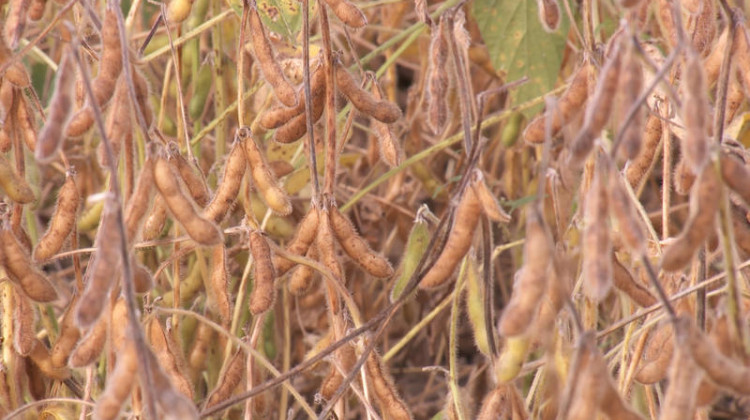
Dicamba can drift off of one soybean field that is resistant to the herbicide and damage a non-resistant field nearby.
FILE PHOTO: Seth Tackett/WTIU NewsA state Senate bill aims to crack down on farmers and others who deliberately misuse pesticides like dicamba while giving people with minor pesticide violations a break. The bill passed unanimously in a Senate committee on Monday.
The legislation authored by Sen. Jean Leising (R-Oldenburg) was crafted in collaboration with several different industries after efforts to increase pesticide fines failed last year. The Environmental Protection Agency defines a pesticide as anything used to prevent, destroy, repel, or mitigate pests — that includes herbicides.
If not used correctly, the weed killer dicamba can drift off of farm fields and kill neighboring crops. Under the bill, someone who knowingly misused a restricted-use pesticide like dicamba could get a $1,000 fine.
Dave Scott is with the Office of Indiana State Chemist. He said the state would also still be able to modify, suspend, or revoke a violator’s license to use pesticides.
“Those are still options if it's determined that a penalty is not adequate to fix the situation," he said.
READ MORE: How Do I Follow Indiana's Legislative Session? Here's Your Guide To Demystify The Process
Join the conversation and sign up for the Indiana Two-Way. Text "Indiana" to 73224. Your comments and questions in response to our weekly text help us find the answers you need on COVID-19 and other statewide issues.
But the bill would go easy on people who commit minor violations. People who receive a fine of $500 or less would be able to take action to reduce the amount of the fine — such as cooperating with the state chemist, compensating victims, or taking action to prevent further violations.
“For example, if they don't have a license and they're applying pesticides commercially — if they go ahead and get the license, that's part of that cooperation," said John Baugh, Purdue University’s director of agricultural services regulations.
Someone fined $250 or less could be let off with a warning — as long as they haven’t already received one about that violation in the past five years.
Right now, anyone who violates any pesticide law in the state can receive up to $250 for the first offense, up to $500 for the second offense, and up to $1,000 for the third offense and any further violations.
A similar bill has been proposed in the House.
Contact Rebecca at rthiele@iu.edu or follow her on Twitter at @beckythiele.
Indiana Environmental reporting is supported by the Environmental Resilience Institute, an Indiana University Grand Challenge project developing Indiana-specific projections and informed responses to problems of environmental change.
 DONATE
DONATE






 Support WFYI. We can't do it without you.
Support WFYI. We can't do it without you.